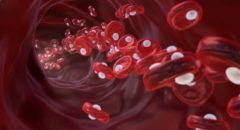
People who inherit one sickle cell gene and one normal gene have what’s called sickle cell trait. This means the person won’t have the disease, but will be a trait “carrier” and can pass it on to his or her children.
Who is most affected by sickle cell trait?
Sickle cell trait can affect people from all walks of life, including those whose ancestors come from Africa, South or Central America, the Caribbean, Mediterranean countries, India, and Saudi Arabia.
Singer T-Boz revealed that when she was first diagnosed with the incurable sickle cell anemia, doctors told her she wouldn’t live past 30, wouldn’t have children and would be disabled. She beat the odds now with a daughter, and living the life she always desired.
Usually, people with sickle cell trait live a normal life without any of the symptoms of sickle cell disease, but it’s possible for them to have complications under extreme conditions.
What are the complications of sickle cell trait?
Most people with sickle cell trait do not have any symptoms of sickle cell trait, although—in rare cases—people with sickle cell trait might experience complications such as death of spleen tissue due to lack of blood flow, called splenic infarction. The symptoms of splenic infarction vary but symptoms such as abdominal pain and/or fever, nausea and vomiting are most common and you should see your physician if you experience these symptoms. Another complication seen in people with sickle cell trait is reduced ability to concentrate urine called hyposthenuria which may lead to dehydration. Also, although rare, people with sickle cell trait may have a greater risk of sudden collapse or death due to intense exercise. In rare cases, the following conditions could be harmful for people with sickle cell trait by making them more likely to experience the complications above:
- Increased pressure in the atmosphere which can be experienced, for example, while scuba diving.
- Low oxygen levels in the air which can be experienced, for example, when mountain climbing, exercising extremely hard in military boot camp, or training for an athletic competition.
- Dehydration.
- High altitudes experienced when flying, mountain climbing, or visiting a city at a high altitude.
How can I find out if I have sickle cell trait?
It's important to know whether or not you have sickle cell trait so that you can know your chances of having a child with sickle cell disease or... take measures to protect yourself if you plan to engage in activities under conditions that may be harmful for people with sickle cell trait. Sickle cell trait is identified with a simple blood test by a physician.
We encourage you to also talk with your family and get to know your family health history.
If you have questions about sickle cell trait:
- Talk with your doctor and family to find out your sickle cell trait status
- Learn about genetic counseling http://www.cdc.gov/ncbddd/pediatricgenetics/genetic_counseling.html
- Contact your sickle cell healthcare provider or organization to find out how to get tested
http://www.cdc.gov/ncbddd/sicklecell/documents/SickleCellDIRECTORY_508.pdf
- Get the Facts About Sickle Cell Trait
http://www.cdc.gov/ncbddd/sicklecell/documents/SCD%20factsheet_Sickle%20Cell%20Trait.pdf
http://www.cdc.gov/ncbddd/sicklecell/traits.html
Follow me on Twitter twitter.com/drgrantcdc
By Dr. Althea Grant, BDO Sickle Cell Expert
Althea Grant, PhD, is Chief of the Epidemiology and Surveillance Branch in the Division of Blood Disorders of the National Center on Birth Defects and Developmental Disabilities. Dr. Grant has specifically been recognized for her contribution to developing public health programs and resources for sickle cell disease and sickle cell trait.









